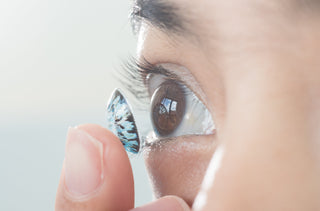Do you have a cold feeling or discomfort in your eye? Cold weather and temperature changes can make your eyes more sensitive in winter. Sometimes, your eyes can sting, become irritated or redden due to the cold and dryness. Take care of your eyes this winter by protecting them. Find out how cold weather affects your eyes and how to protect them.
In addition to these tips, if you experience persistent discomfort or have concerns about your eye health during winter, consider consulting with an eye care professional for personalized advice."
Cold weather and your eyes
During the winter, your eyes are constantly exposed to varying temperatures: warm inside and cold outside. This can cause some people to experience eye discomfort, like:
- A sensation of sand in your eyes
- Itching
- Dry eyes
- Red eyes
- Irritation
Dryness of the eyes caused by the cold
Some people's skin dries out faster in winter than in summer. This is because the air is drier when it is cold. And just like the skin, your eyes can dry out more quickly in cold weather.
Without spending much time outdoors, your eyes can quickly become dry. Heating in homes and vehicles also dries out the air and, therefore, your eyes.
Also, if you have discomfort or watery eyes, it can be a sign of dryness. These symptoms also tend to make wearing contact lenses uncomfortable.
If you experience eye discomfort, you can start by applying eye drops. If the symptoms persist, do not hesitate to make an appointment for an examination.
Red or swollen eyes due to the cold
A cold snap can cause your eyes to swell due to the constriction of blood vessels. Indeed, when it is cold outside, certain blood vessels in the body tend to let less blood through. This reduces the oxygen supply and the temperature of your eye tissues. Your eyes may become red, swell up or have eyelid spasms.
Cold weather and blepharitis
People with blepharitis are more likely to experience increased sensitivity to cold air. The tears produced by the eyes are insufficient in quantity or quality to protect the eye's surface from the cold. This condition can cause your eyes to water a great deal.
Is there a danger that the cold will freeze my eyes?
Rest assured, your eyes won't freeze even if you spend all day skiing. Your eyes are kept warm inside your eye sockets, where they are surrounded by muscles and supplied with blood at 37°C.
For contact lenses, it's the same thing. They don't freeze on your eyes, even in the coldest weather. The cornea of the eye continuously transmits heat to your contact lenses.
Tips to protect your eyes from the cold
Cold weather is not harmless for your eyes. We recommend you adopt specific measures to maximize your comfort in winter. If in doubt, visit your nearest IRIS store to obtain advice from our eye care professionals.
Here are 4 tips to protect yourself and have a pleasant winter:
- Drink water regularly to help your eyes stay well-hydrated
- Monitor the humidity level in your home and, if necessary, install a humidifier
- Wear sunglasses when outdoors. For sports activities in the snow, wear wraparound glasses or a mask.
- If your eyes are dry, use eye drops. You can also turn down the heat in your bedroom and home.





















































